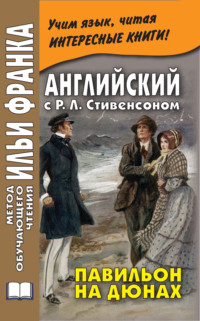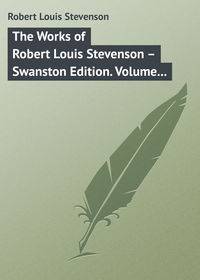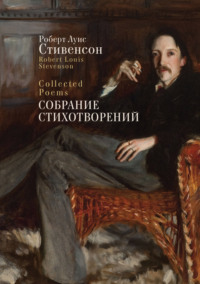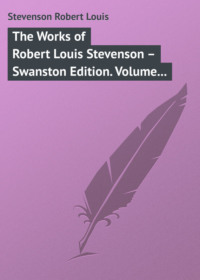 полная версия
полная версияSongs of Travel, and Other Verses
XXXV
The tropics vanish, and meseems that I,From Halkerside, from topmost Allermuir,Or steep Caerketton, dreaming gaze again.Far set in fields and woods, the town I seeSpring gallant from the shallows of her smoke,Cragged, spired, and turreted, her virgin fortBeflagged. About, on seaward-drooping hills,New folds of city glitter. Last, the ForthWheels ample waters set with sacred isles,And populous Fife smokes with a score of towns.There, on the sunny frontage of a hill,Hard by the house of kings, repose the dead,My dead, the ready and the strong of word.Their works, the salt-encrusted, still survive;The sea bombards their founded towers; the nightThrills pierced with their strong lamps. The artificers,One after one, here in this grated cell,Where the rain erases, and the rust consumes,Fell upon lasting silence. ContinentsAnd continental oceans intervene;A sea uncharted, on a lampless isle,Environs and confines their wandering childIn vain. The voice of generations deadSummons me, sitting distant, to arise,My numerous footsteps nimbly to retrace,And, all mutation over, stretch me downIn that denoted city of the dead.Apemama.XXXVI – TO S. C
I heard the pulse of the besieging seaThrob far away all night. I heard the windFly crying and convulse tumultuous palms.I rose and strolled. The isle was all bright sand,And flailing fans and shadows of the palm;The heaven all moon and wind and the blind vault;The keenest planet slain, for Venus slept. The king, my neighbour, with his host of wives,Slept in the precinct of the palisade;Where single, in the wind, under the moon,Among the slumbering cabins, blazed a fire,Sole street-lamp and the only sentinel. To other lands and nights my fancy turned —To London first, and chiefly to your house,The many-pillared and the well-beloved.There yearning fancy lighted; there againIn the upper room I lay, and heard far offThe unsleeping city murmur like a shell;The muffled tramp of the Museum guardOnce more went by me; I beheld againLamps vainly brighten the dispeopled street;Again I longed for the returning morn,The awaking traffic, the bestirring birds,The consentaneous trill of tiny songThat weaves round monumental cornicesA passing charm of beauty. Most of all,For your light foot I wearied, and your knockThat was the glad réveillé of my day. Lo, now, when to your task in the great houseAt morning through the portico you pass,One moment glance, where by the pillared wallFar-voyaging island gods, begrimed with smoke,Sit now unworshipped, the rude monumentOf faiths forgot and races undivined:Sit now disconsolate, remembering wellThe priest, the victim, and the songful crowd,The blaze of the blue noon, and that huge voice,Incessant, of the breakers on the shore.As far as these from their ancestral shrine,So far, so foreign, your divided friendsWander, estranged in body, not in mind.Apemama.XXXVII – THE HOUSE OF TEMBINOKA
[At my departure from the island of Apemama, for which you will look in vain in most atlases, the King and I agreed, since we both set up to be in the poetical way, that we should celebrate our separation in verse. Whether or not his Majesty has been true to his bargain, the laggard posts of the Pacific may perhaps inform me in six months, perhaps not before a year. The following lines represent my part of the contract, and it is hoped, by their pictures of strange manners, they may entertain a civilised audience. Nothing throughout has been invented or exaggerated; the lady herein referred to as the author’s muse has confined herself to stringing into rhyme facts or legends that I saw or heard during two months’ residence upon the island. – R. L. S.]
ENVOILet us, who part like brothers, part like bards;And you in your tongue and measure, I in mine,Our now division duly solemnise.Unlike the strains, and yet the theme is one:The strains unlike, and how unlike their fate!You to the blinding palace-yard shall callThe prefect of the singers, and to him,Listening devout, your valedictory verseDeliver; he, his attribute fulfilled,To the island chorus hand your measures on,Wed now with harmony: so them, at last,Night after night, in the open hall of dance,Shall thirty matted men, to the clapped hand,Intone and bray and bark. Unfortunate!Paper and print alone shall honour mine.THE SONGLet now the King his ear arouseAnd toss the bosky ringlets from his brows,The while, our bond to implement,My muse relates and praises his descent.IBride of the shark, her valour first I singWho on the lone seas quickened of a King.She, from the shore and puny homes of men,Beyond the climber’s sea-discerning ken,Swam, led by omens; and devoid of fear,Beheld her monstrous paramour draw near.She gazed; all round her to the heavenly pale,The simple sea was void of isle or sail —Sole overhead the unsparing sun was reared —When the deep bubbled and the brute appeared.But she, secure in the decrees of fate,Made strong her bosom and received the mate,And, men declare, from that marine embraceConceived the virtues of a stronger race.IIHer stern descendant next I praise,Survivor of a thousand frays: —In the hall of tongues who ruled the throng;Led and was trusted by the strong;And when spears were in the wood,Like a tower of vantage stood: —Whom, not till seventy years had sped,Unscarred of breast, erect of head,Still light of step, still bright of look,The hunter, Death, had overtook.IIIHis sons, the brothers twain, I sing,Of whom the elder reigned a King.No Childeric he, yet much declinedFrom his rude sire’s imperious mind,Until his day came when he died,He lived, he reigned, he versified.But chiefly him I celebrateThat was the pillar of the state,Ruled, wise of word and bold of mien,The peaceful and the warlike scene;And played alike the leader’s partIn lawful and unlawful art.His soldiers with emboldened earsHeard him laugh among the spears.He could deduce from age to ageThe web of island parentage;Best lay the rhyme, best lead the dance,For any festal circumstance:And fitly fashion oar and boat,A palace or an armour coat.None more availed than he to raiseThe strong, suffumigating blaze,Or knot the wizard leaf: none more,Upon the untrodden windward shoreOf the isle, beside the beating main,To cure the sickly and constrain,With muttered words and waving rods,The gibbering and the whistling gods.But he, though thus with hand and headHe ruled, commanded, charmed, and led,And thus in virtue and in mightTowered to contemporary sight —Still in fraternal faith and love,Remained below to reach above,Gave and obeyed the apt command,Pilot and vassal of the land.IVMy Tembinok’ from men like theseInherited his palaces,His right to rule, his powers of mind,His cocoa-islands sea-enshrined.Stern bearer of the sword and whip,A master passed in mastership,He learned, without the spur of need,To write, to cipher, and to read;From all that touch on his prone shoreAugments his treasury of lore,Eager in age as erst in youthTo catch an art, to learn a truth,To paint on the internal pageA clearer picture of the age.His age, you say? But ah, not so!In his lone isle of long ago,A royal Lady of Shalott,Sea-sundered, he beholds it not;He only hears it far away.The stress of equatorial dayHe suffers; he records the whileThe vapid annals of the isle;Slaves bring him praise of his renown,Or cackle of the palm-tree town;The rarer ship and the rare boatHe marks; and only hears remote,Where thrones and fortunes rise and reel,The thunder of the turning wheel.VFor the unexpected tears he shedAt my departing, may his lion headNot whiten, his revolving yearsNo fresh occasion minister of tears;At book or cards, at work or sport,Him may the breeze across the palace courtFor ever fan; and swelling nearFor ever the loud song divert his ear.Schooner ‘Equator,’ at Sea.XXXVIII – THE WOODMAN
In all the grove, nor stream nor birdNor aught beside my blows was heard,And the woods wore their noonday dress —The glory of their silentness.From the island summit to the seas,Trees mounted, and trees drooped, and treesGroped upward in the gaps. The greenInarboured talus and ravineBy fathoms. By the multitudeThe rugged columns of the woodAnd bunches of the branches stood;Thick as a mob, deep as a sea,And silent as eternity.With lowered axe, with backward head,Late from this scene my labourer fled,And with a ravelled tale to tell,Returned. Some denizen of hell,Dead man or disinvested god,Had close behind him peered and trod,And triumphed when he turned to flee.How different fell the lines with me!Whose eye explored the dim arcadeImpatient of the uncoming shade —Shy elf, or dryad pale and cold,Or mystic lingerer from of old:Vainly. The fair and stately things,Impassive as departed kings,All still in the wood’s stillness stood,And dumb. The rooted multitudeNodded and brooded, bloomed and dreamed,Unmeaning, undivined. It seemedNo other art, no hope, they knew,Than clutch the earth and seek the blue.’Mid vegetable king and priestAnd stripling, I (the only beast)Was at the beast’s work, killing; hewedThe stubborn roots across, bestrewedThe glebe with the dislustred leaves,And bade the saplings fall in sheaves;Bursting across the tangled mathA ruin that I called a path,A Golgotha that, later on,When rains had watered, and suns shone,And seeds enriched the place, should bearAnd be called garden. Here and there,I spied and plucked by the green hairA foe more resolute to live,The toothed and killing sensitive.He, semi-conscious, fled the attack;He shrank and tucked his branches back;And straining by his anchor-strand,Captured and scratched the rooting hand.I saw him crouch, I felt him bite;And straight my eyes were touched with sight.I saw the wood for what it was:The lost and the victorious cause,The deadly battle pitched in line,Saw silent weapons cross and shine:Silent defeat, silent assault,A battle and a burial vault.Thick round me in the teeming mudBrier and fern strove to the blood:The hooked liana in his ginNoosed his reluctant neighbours in:There the green murderer throve and spread,Upon his smothering victims fed,And wantoned on his climbing coil.Contending roots fought for the soilLike frightened demons: with despairCompeting branches pushed for air.Green conquerors from overheadBestrode the bodies of their dead:The Caesars of the sylvan field,Unused to fail, foredoomed to yield:For in the groins of branches, lo!The cancers of the orchid grow.Silent as in the listed ringTwo chartered wrestlers strain and cling;Dumb as by yellow Hooghly’s sideThe suffocating captives died;So hushed the woodland warfare goesUnceasing; and the silent foesGrapple and smother, strain and claspWithout a cry, without a gasp.Here also sound thy fans, O God,Here too thy banners move abroad:Forest and city, sea and shore,And the whole earth, thy threshing-floor!The drums of war, the drums of peace,Roll through our cities without cease,And all the iron halls of lifeRing with the unremitting strife.The common lot we scarce perceive.Crowds perish, we nor mark nor grieve:The bugle calls – we mourn a few!What corporal’s guard at Waterloo?What scanty hundreds more or lessIn the man-devouring Wilderness?What handful bled on Delhi ridge?– See, rather, London, on thy bridgeThe pale battalions trample by,Resolved to slay, resigned to die.Count, rather, all the maimed and deadIn the unbrotherly war of bread.See, rather, under sultrier skiesWhat vegetable Londons rise,And teem, and suffer without sound:Or in your tranquil garden ground,Contented, in the falling gloom,Saunter and see the roses bloom.That these might live, what thousands died!All day the cruel hoe was plied;The ambulance barrow rolled all day;Your wife, the tender, kind, and gay,Donned her long gauntlets, caught the spud,And bathed in vegetable blood;And the long massacre now at end,See! where the lazy coils ascend,See, where the bonfire sputters redAt even, for the innocent dead.Why prate of peace? when, warriors all,We clank in harness into hall,And ever bare upon the boardLies the necessary sword.In the green field or quiet street,Besieged we sleep, beleaguered eat;Labour by day and wake o’ nights,In war with rival appetites.The rose on roses feeds; the larkOn larks. The sedentary clerkAll morning with a diligent penMurders the babes of other men;And like the beasts of wood and park,Protects his whelps, defends his den.Unshamed the narrow aim I hold;I feed my sheep, patrol my fold;Breathe war on wolves and rival flocks,A pious outlaw on the rocksOf God and morning; and when timeShall bow, or rivals break me, climbWhere no undubbed civilian dares,In my war harness, the loud stairsOf honour; and my conquerorHail me a warrior fallen in war.Vailima.XXXIX – TROPIC RAIN
As the single pang of the blow, when the metal is mingled well,Rings and lives and resounds in all the bounds of the bell,So the thunder above spoke with a single tongue,So in the heart of the mountain the sound of it rumbled and clung.Sudden the thunder was drowned – quenched was the levin light —And the angel-spirit of rain laughed out loud in the night.Loud as the maddened river raves in the cloven glen,Angel of rain! you laughed and leaped on the roofs of men;And the sleepers sprang in their beds, and joyed and feared as you fell.You struck, and my cabin quailed; the roof of it roared like a bell.You spoke, and at once the mountain shouted and shook with brooks.You ceased, and the day returned, rosy, with virgin looks.And methought that beauty and terror are only one, not two;And the world has room for love, and death, and thunder, and dew;And all the sinews of hell slumber in summer air;And the face of God is a rock, but the face of the rock is fair.Beneficent streams of tears flow at the finger of pain;And out of the cloud that smites, beneficent rivers of rain.Vailima.XL – AN END OF TRAVEL
Let now your soul in this substantial worldSome anchor strike. Be here the body moored; —This spectacle immutably from nowThe picture in your eye; and when time strikes,And the green scene goes on the instant blind —The ultimate helpers, where your horse to-dayConveyed you dreaming, bear your body dead.Vailima.XLI
We uncommiserate pass into the nightFrom the loud banquet, and departing leaveA tremor in men’s memories, faint and sweetAnd frail as music. Features of our face,The tones of the voice, the touch of the loved hand,Perish and vanish, one by one, from earth:Meanwhile, in the hall of song, the multitudeApplauds the new performer. One, perchance,One ultimate survivor lingers on,And smiles, and to his ancient heart recallsThe long forgotten. Ere the morrow die,He too, returning, through the curtain comes,And the new age forgets us and goes on.XLII
Sing me a song of a lad that is gone, Say, could that lad be I?Merry of soul he sailed on a day Over the sea to Skye.Mull was astern, Rum on the port, Eigg on the starboard bow;Glory of youth glowed in his soul: Where is that glory now?Sing me a song of a lad that is gone, Say, could that lad be I?Merry of soul he sailed on a day Over the sea to Skye.Give me again all that was there, Give me the sun that shone!Give me the eyes, give me the soul, Give me the lad that’s gone!Sing me a song of a lad that is gone, Say, could that lad be I?Merry of soul he sailed on a day Over the sea to Skye.Billow and breeze, islands and seas, Mountains of rain and sun,All that was good, all that was fair, All that was me is gone.XLIII – TO S. R. CROCKETT
(On receiving a Dedication)Blows the wind to-day, and the sun and the rain are flying, Blows the wind on the moors to-day and now,Where about the graves of the martyrs the whaups are crying, My heart remembers how!Grey recumbent tombs of the dead in desert places, Standing stones on the vacant wine-red moor,Hills of sheep, and the howes of the silent vanished races, And winds, austere and pure:Be it granted me to behold you again in dying, Hills of home! and to hear again the call;Hear about the graves of the martyrs the peewees crying, And hear no more at all.Vailima.XLIV – EVENSONG
The embers of the day are redBeyond the murky hill.The kitchen smokes: the bedIn the darkling house is spread:The great sky darkens overhead,And the great woods are shrill.So far have I been led,Lord, by Thy will:So far I have followed, Lord, and wondered still.The breeze from the enbalmèd landBlows sudden toward the shore,And claps my cottage door.I hear the signal, Lord – I understand.The night at Thy commandComes. I will eat and sleep and will not question more.Vailima.1
This is the same Princess Moë whose charms of person and disposition have been recorded by the late Lord Pembroke in South Sea Bubbles, and by M. Pierre Loti in the Mariage de Loti.
2
The yacht Casco had been so called by the people of Fakarava in the Paumotus.









